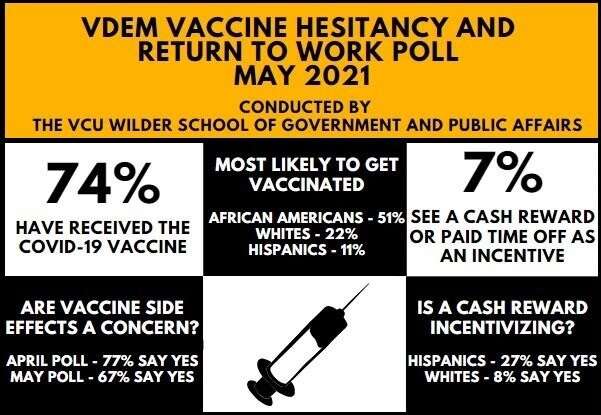Unvaccinated minorities in Virginia are more likely to get vaccinated than unvaccinated whites

While Virginia has now surpassed the 70% mark for vaccinations among adults, there are significant differences among racial and ethnic groups regarding willingness to get the vaccine, according to the new statewide vaccine poll conducted for the Virginia Department of Emergency Management by the Research Institute for Social Equity (RISE) at the L. Douglas Wilder School of Government and Public Affairs at Virginia Commonwealth University.
When asked if they were likely to get vaccinated, only 6% of unvaccinated whites said that they were likely to do so. Willingness among unvaccinated racial and ethnic minorities was higher, with 15% of unvaccinated African-Americans, 10% of unvaccinated Asians, and 11% of unvaccinated Hispanics saying that they are likely to get vaccinated.
Compared to the April poll, there has been a marked decrease in concern regarding vaccine side effects (77% vs. 67%) and concern about how well the vaccines work (44% vs. 37%). Other reasons for not getting vaccinated include concern over how quickly the vaccines were developed and tested (72%) and a belief that the vaccine is not needed (43%). Approximately 7% of respondents indicated that receiving a cash reward or paid time off work would increase their willingness to get vaccinated while only 3% said a gift card would influence their willingness to get the COVID-19 vaccine. Though few respondents found a cash reward to be incentivizing, those who were the most incentivized by this reward had a family income of $100,000 or more (15%). Hispanic respondents (27%) were three times as likely as white respondents (8%) to find a cash reward incentivizing.
"Objective and relevant observation of the effects of race in American society is displayed by these poll responses. These data can be used to address the systemic and recurring effects in fostering the role of government," said former Gov. L. Douglas Wilder.
Parents' willingness to vaccinate their children
The majority of parents are willing to vaccinate their children, with 59% of parents with children ages 12-15 saying that they are likely to vaccinate their children and 53% of parents with children ages 11 and under saying that they are likely to vaccinate their children.
There are racial differences in parental willingness to vaccinate their children, with fewer white parents saying that they are likely to vaccinate children ages 12-15 (52%) and ages 11 and under (44%) compared to African American parents (61% and 62%, respectively). In addition, parents residing in the Northwestern and Western regions of the state have the highest levels of parental hesitancy for vaccinating their children. Sixty-eight percent of parents with children ages 11 and under who live in the Northwest region of the state are unwilling to have their children vaccinated. Similarly, more than half (57%) of the parents of children ages 11 and under who reside in the Western region of the state were unwilling to get their children vaccinated. Additionally, 72% of those with children ages 12-15 in the Western part of the state were not likely to vaccinate their children and 30% of those parents residing in the Northwestern region were unwilling to vaccinate their children 12-15 years of age.
Virginia's response to COVID-19
Respondents were mostly favorable when asked about the effectiveness of their state and local leaders at providing answers and information to the public regarding COVID-19. They were most favorable of Gov. Ralph Northam (61%) and the state health director (56%). The majority also rated their locally elected officials (54%) positively.
Race influenced the ratings regarding the communication response during COVID 19. With respect to Northam, Asian (80%) and African American respondents (78%) were most favorable of the communication response of COVID-19 followed by Hispanic (75%) and white respondents (63%) respondents. Political affiliation also had a strong impact on ratings for elected officials with respect to how effective they were communicating to the public about COVID-19. For all state and local leaders, respondents who identified as Democrat provided the most favorable ratings.
More information: For the full poll results and analysis, visit oppo.vcu.edu/policy-poll/





















